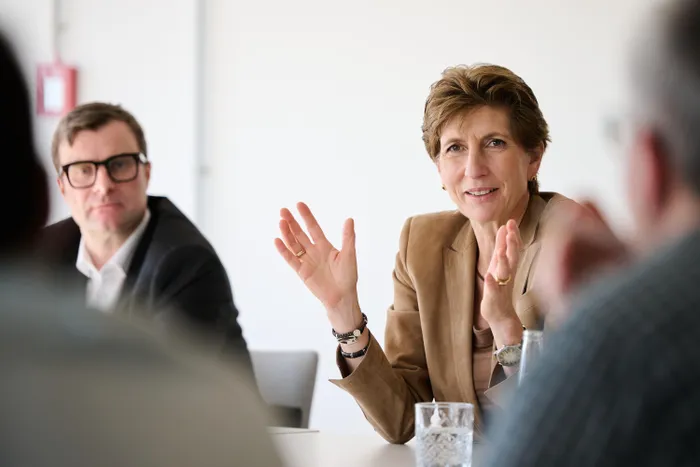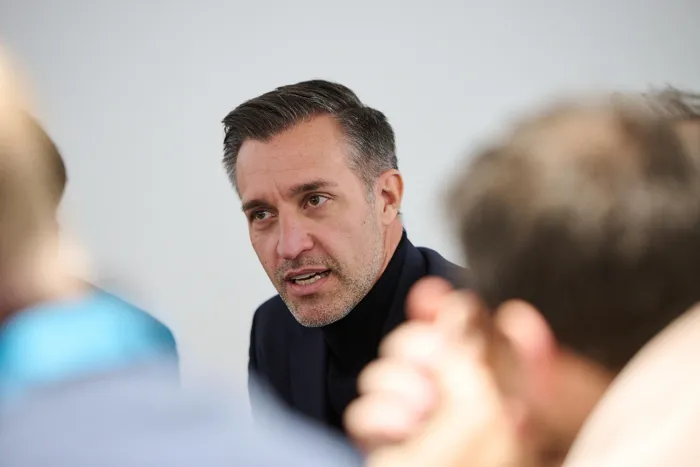BMW maintains premium-segment leadership despite surge of Chinese brands, market disruptions

Ilka Horstmeier, BMW AG Board Member for People and Real Estate, speaking at one of the sessions of the Responsibility Days in Munich.
Image: Supplied
BMW Group has said it continues to hold a commanding lead in the premium vehicle segment despite a decade-long decline in luxury car sales and growing competitive pressure from rapidly expanding Chinese automakers.
This was revelead by the BMW's top executives during the recent tour of the company's plants in Munich as part of the 2025 Responsibility Days. The programme is BMW’s way of opening its doors to demonstrate how the company is tackling sustainability, workforce development and industrial transformation across its global operations.
Each year, it highlights a different plant and a unique set of challenges, giving participants an on-the-ground view of how BMW’s long-term strategies play out in real-world production. The 2025 edition was held in Munich, where BMW is undertaking one of the most complex restructurings in its global manufacturing network.
Ilka Horstmeier, BMW AG Board Member for People and Real Estate, said the company’s strength in is rooted in long-term commitment, consistent quality, and a customer-centric strategy that differentiates BMW from newer market entrants.
“In markets with an influx of Asian brands, including South Africa, competitiveness is about far more than the car itself,” Horstmeier said. “We offer a full 360-degree package — long-term quality, premium design, strong aftersales support, and deep customer loyalty. We are not here for short-term gains. We’ve been operating in South Africa for 50 years, and we are here to stay.”
While Chinese brands such as Haval, Chery, and GWM have grown sharply due to affordability and market repositioning, BMW retains the largest share of the premium segment. The company attributes this to customer trust, brand heritage, and a production base that has maintained global relevance even amid shifting trade dynamics and supply chain risks.
Horstmeier said the company’s global production network is deliberately designed for agility — a key factor in its ability to absorb shocks such as US tariff fluctuations, supply chain bottlenecks, and disrupted trade flows.
“The genetic code of our production network is flexibility,” she said. “Whenever tariffs arise, we can reshuffle volume. For example, South Africa is now supplying Canada due to recent tariff adjustments. That adaptability keeps our plants competitive.”
Year-on-year, the BMW Group achieved a slight 2.4% increase in deliveries, reaching a total of 1.8 million vehicles in the year-to-date by end of September. In the third quarter, the premium manufacturer delivered 588 140 BMW, MINI and Rolls-Royce vehicles to customers, up 8.7% from 540 881 vehicles in 2024.
The BMW Group expects further positive growth momentum in 2026 from the all-new BMW iX3, the first model of the Neue Klasse.
The Rosslyn plant is also being prepared for BMW’s next major technological leap — the Neue Klasse platform — which begins global production in 2026. BMW’s long-term investment in major model advancements is intended to reinforce South Africa’s role in the group’s global manufacturing footprint.

Nikolai Martin, BMW Board Member for Purchasing and Supplier Network, said the company’s resilience is also supported by deep localisation strategies in markets such as China, where BMW has built broad supplier partnerships and co-developed components to strengthen competitiveness.
Image: Supplied
Nikolai Martin, BMW Board Member for Purchasing and Supplier Network, said the company’s resilience is also supported by deep localisation strategies in markets such as China, where BMW has built broad supplier partnerships and co-developed components to strengthen competitiveness.
“We create products that meet market requirements because we produce locally and use the local supplier network,” Martin said. “This structure allows us to react quickly to disruptions, whether related to chips, tariffs, or raw materials.”
He added that improvements in battery cell sustainability — driven largely by Chinese suppliers shifting to renewable energy — have enabled BMW to reduce the carbon footprint of next-generation vehicles by 22% compared to previous models.
On tariffs, Martin noted that BMW has absorbed significant cost pressure to avoid passing these increases on to customers.
“We chose not to hand over tariff costs to consumers,” he said. “Instead, we optimised allocations across markets, restructured supply chains where necessary, and delayed shipping of some components until negotiations improved conditions.”
Despite global volatility, BMW insists that flexibility, technological investment and a diversified supply chain allow the group — including South Africa’s operations — to remain competitive even as the market undergoes unprecedented shifts.
Martin said BMW continues to advocate for technology openness, predicting that internal combustion engines, hybrids, full-electric vehicles, and hydrogen will all coexist beyond 2025 to meet varied customer needs and infrastructure realities across different regions.
For BMW South Africa, holding its lead in the premium market — even as overall premium sales soften — is a testament, executives say, to the company’s ability to adapt while maintaining a strong, loyal customer base.
“We are focused on long-term success,” Horstmeier said. “That philosophy is what keeps us competitive, even as the market changes around us.”
BUSINESS REPORT